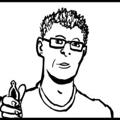This book is fantastic in so many ways. I've had it on my list for a while, but I felt like I finally needed to sit down and read it.
First, it actually provides a lot of information about one of the most infamous people in science that many had never even heard of: Henrietta Lacks. It's disappointing that one (black) woman's cells were used to do so much for scientific advancement, and her family was never made aware. It's not at all shocking, especially considering the Jim Crow laws of the early 1900s (and the remaining segregation through varying policies that have intentionally targeted Black Americans). The details around Henrietta's family are amazing, reminding us all of something that went largely unacknowledged for decades (and, honestly, still lacking in a lot of human-based scientific research): She was human, and she had people who cared for her.
And they all deserved to know everything as it happened. Henrietta deserved to know that she had made a 'donation'. Her family deserved to know why their blood was being drawn and what it might be used for. Above all, for HeLa being so widely used in medical research and having so many impacts on our lives today, Henrietta deserved to be known for her role in it all. Without her, who knows if someone else's cells would've transformed science in the ways hers had and where we'd be now.
Second, it discusses a lot of the ethics controversies that exist in research, particularly within medical science. This is done this with a lot of fairness, too. Skloot doesn't really sugarcoat or explain away important pieces of information, just to make it sound better because one Good Thing came out of A Lot of Not Good (and Sometimes Bad) Things. She acknowledges the history of varying elements, their impact on people and societies, and the ways in which they can be seen today.
There are a lot of issues with tissue 'donation', which is largely that it's not always truly donated. Even years later, we are still struggling with the concept and how to work on it; this is despite the fact that, while there were always fears of patients holding up science, it seems that pharmaceutical companies and other patent-holders have been the exact problem they believed patients would've been. Many researchers seem to neglect the human element, which is infuriating. In so many areas of Henrietta's (and her family's) stories, this was so apparent.
Note: I'm saying the above as someone who intentionally worked on social policy in another area of science (environmental), trying to convey information laced in jargon to 'the common person' because so many (generally white and male) scientists honestly can't be bothered to actually do the community work (and then openly wonder why people don't trust them). The 'holier than thou' attitude didn't help, either. Along with openly ignoring the history of their own fields, which often hint at why 'common people' are cautious.












